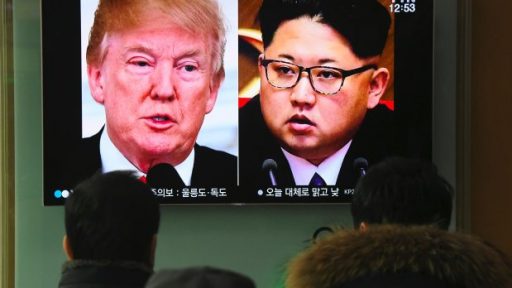- Home
- >
- Daily Accents
- >
- Deal or no deal, a Trump-Kim summit may have major implications for Asia

Deal or no deal, a Trump-Kim summit may have major implications for Asia

The looming meeting between President Donald Trump and North Korean leader Kim Jong Un could alter Asia's security landscape regardless of whether the politicians reach an agreement or not.
At the heart of any potential deal is the definition of denuclearization. Pyongyang has previously said it may only dismantle nuclear weapons if Washington removes its 28,500 troops in South Korea — an unsettling prospect for Asian allies that rely on America's defense commitments. Alternatively, a failure to ink any sort of pact could bolster U.S. appetite for preemptive strikes against the North — an equally upsetting situation for the region.
Either outcome may threaten stability and put Asian countries on the defensive. Concerned about the high stakes, South Korean President Moon Jae-In is reportedly attempting to join the potential June 12 meeting.
A deal is struck
If Kim agrees to a staged disarmament — a process in which his regime relinquishes nukes in exchange for concessions such as a reduced U.S. military presence on the Peninsula or sanctions relief — the pace and time frame will be key.
If disarmament is way off in the future, "there's probably little impact" on Asia, but if it's scheduled for the next five years and accompanies an influx of cash for the North Koreans as well as a weakening of the U.S.-South Korean security alliance, "that might make Japan worried," said Sharon Squassoni, former director of policy coordination at the State Department's nonproliferation bureau and currently a research professor at George Washington University.
U.S. soldiers have been stationed in the South since the 1950s and a potential withdrawal is of major concern for neighboring Japan.
That is, it raises the possibility of the world's largest economy next closing down its military bases in Japan, analysts at the International Institute for Strategic Studies said in a Monday note.
Moreover, staged disarmament could leave South Korea and Japan "exposed to the North's shorter-range missiles" with the rogue state's threat likely boosted by a stronger domestic economy, the note continued.
"Any agreement that removes the North Korean nuclear threat from the United States, but leaves Japan and South Korea vulnerable to a North Korean attack would be cause for concern," echoed Troy Stangarone, senior director at Korea Economic Institute, a Washington-based think tank.
There's some hope among Japan, Taiwan and certain Southeast Asian nations that a reduction of American forces in South Korea could result in a reordering of U.S. deployments to better counter China's maritime assertiveness, the IISS note said. But there's "no guarantee" of that happening, it continued.
Rather, a troop reduction would "send a signal to the rest of the region that the United States was a waning presence rather than a source of stability," said Stangarone.
Earlier this month, American Defense Secretary James Mattis said U.S. troops wouldn't be part of initial negotiations with Kim's government even though that has long remained a North Korean prerequisite for peace.
During the 1970s, the U.S. withdrew some forces in South Korea in a move that prompted Seoul to develop national defense capabilities that included a brief clandestine nuclear weapons program. "We would certainly want to avoid that outcome," warned Squassoni.
No deal is struck
If dialogue breaks down on June 12, that may indicate to U.S. and North Korean officials that diplomacy as a strategy has failed, leaving only military solutions on the table.
"Failure to reach any deal would almost certainly return the military option to the fore as the U.S. administration's preferred means of removing the North Korean threat," said the IISS note.
Others, however, maintain that the chances of conflict remains a distant possibility. Stangarone, for example, said a lack of a deal would likely "result in efforts to intensify economic pressure on the regime to bring it back to the table."
Ultimately, the majority of experts anticipate the summit to produce vague but general commitments to nuclear disarmament. That's "unlikely to have a big impact within Asia because those kinds of commitments are nothing new," Squassoni said.
Stangarone, for his part, said he expects the summit will produce only a general framework or declaration, but warned that it's the working definition of denuclearization that Asian powers will be looking for.
Source: Bloomberg Pro Terminal
 Trader Aleksandar Kumanov
Trader Aleksandar Kumanov Read more:
If you think, we can improve that section,
please comment. Your oppinion is imortant for us.











